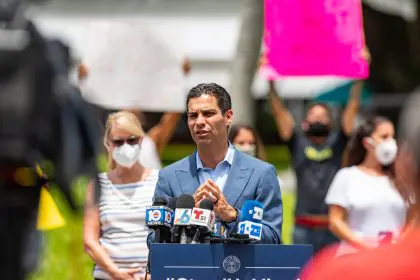President and South Dakota governor target network for reporting on immigrant warning system
President Donald Trump and South Dakota Governor Kristi Noem have escalated their confrontation with CNN, threatening legal action against the network for its coverage of a mobile application that alerts users to Immigration and Customs Enforcement operations. The dispute centers on CNN’s reporting about ICEBlock, a crowd-sourced warning system that has gained popularity among immigrant communities nationwide.
The controversial app
ICEBlock functions as a digital early warning system, allowing users to report ICE agent sightings in real-time. Created by developer Joshua Aaron, the application enables community members to share location data, agent descriptions, and vehicle information through an interactive map interface. The tool has become particularly valuable in cities like Los Angeles, where large-scale deportation operations have intensified concerns among immigrant populations.
Aaron developed the application as a response to what he perceives as increasingly aggressive enforcement tactics. He has drawn parallels between current deportation efforts and historical oppression, viewing his creation as a form of digital resistance against what he considers unjust government actions.
The app’s popularity has grown significantly as immigrant communities seek ways to protect themselves from unexpected enforcement activities. Users can quickly access information about ICE presence in their neighborhoods, potentially allowing them to avoid areas where agents are operating.
Political response intensifies
Speaking from a newly constructed detention facility in Florida, Trump and Noem announced their intention to pursue prosecution against both CNN and the app’s developer. Noem indicated that the Department of Justice is examining potential charges related to what she characterized as encouraging evasion of law enforcement operations.
The governor argued that the network’s coverage actively promotes illegal behavior by informing viewers about the app’s existence and functionality. Trump supported these claims while simultaneously criticizing CNN’s broader coverage as misleading, suggesting the network could face additional legal consequences for its reporting on military operations.
This development represents the latest escalation in Trump’s ongoing conflict with mainstream media outlets. The president has consistently challenged news organizations’ coverage of his policies and actions, though previous legal threats have rarely resulted in successful prosecutions.
Constitutional concerns emerge
Legal scholars have raised significant concerns about the feasibility and constitutionality of prosecuting media organizations for reporting on publicly available applications. First Amendment protections traditionally shield journalists when covering matters of public interest, even when such coverage involves politically sensitive topics.
The legal community has noted that reporting on the existence of a publicly available application does not constitute illegal activity. News organizations routinely cover various technologies and applications without facing legal consequences for their reporting.
Media defends coverage
CNN responded to the threats by asserting that ICEBlock is publicly available and that informing the public about its existence falls within standard journalistic practice. The network emphasized that no laws prohibit reporting on applications that are freely accessible to the public.
The situation has raised broader questions about press freedom and the boundaries of acceptable government criticism of media coverage. First Amendment advocates worry that such threats could create a chilling effect on journalistic reporting, particularly regarding immigration enforcement activities.
Implications for press freedom
The confrontation highlights ongoing tensions between government enforcement priorities and media coverage of immigration issues. While Trump has frequently targeted news organizations through litigation threats, federal prosecutors pursuing charges against a news organization for reporting on legal technology would represent an unprecedented escalation.
The outcome of this dispute could establish important precedents for future interactions between government officials and news organizations. The case underscores the complex relationship between law enforcement activities, community self-protection efforts, and the media’s role in informing the public about both.
As immigration enforcement continues to intensify, the balance between government authority and constitutional protections for both press freedom and community safety remains a critical ongoing challenge in American politics.















